Permeable resin-bound gravel delivers key environmental advantages for UK properties. The surface drastically cuts water runoff, which helps prevent local flooding – particularly useful during Britain’s wet winters. By allowing rainwater to seep naturally into the ground, it maintains water tables and reduces strain on storm drains.
The material creates a natural habitat that supports local wildlife and plant life, from native wildflowers to garden birds. It meets SUDS requirements, making it ideal for new builds and renovations across the UK. In urban areas, it helps cool surrounding temperatures by absorbing less heat than traditional paving or tarmac.
These practical benefits make resin-bound gravel an environmentally sound choice for driveways, paths and garden spaces whilst meeting modern drainage standards.
Key Takeaways
Resin-bound gravel offers brilliant environmental perks for UK properties:
The surface lets 95% of rainwater soak straight through, which tackles common British problems like waterlogged gardens and localised flooding. It’s particularly useful in rainy regions like Manchester and Scotland.
The permeable nature creates a healthier environment for garden wildlife – perfect for supporting local insects, plants and birds. Think of it as a welcome mat for hedgehogs and other garden visitors.
Whilst the upfront cost might seem steep, it lasts up to 30 years – far longer than tarmac or loose gravel. You’ll spend less time and money on maintenance over the years.
Unlike concrete, it doesn’t trap heat during our increasingly warm summers. This helps keep outdoor spaces cooler, particularly important in built-up areas like London where the heat island effect is strongest.
The finished look is smart and practical, combining kerb appeal with proper drainage – essential for our wet British climate.
Reduced Surface Water Runoff
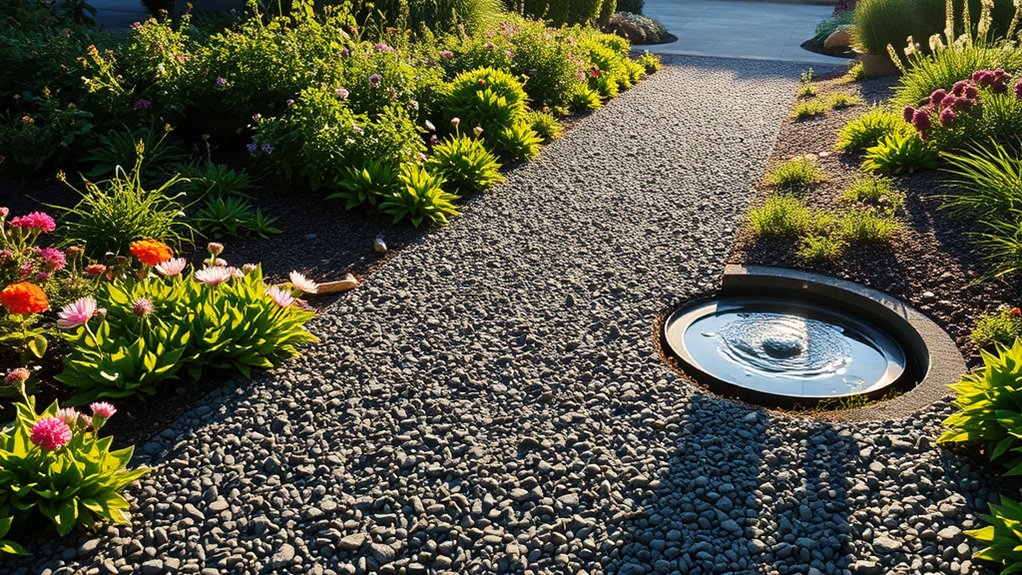
Surface water runoff, whilst natural after rainfall, can cause serious problems like flash floods and soil erosion in urban areas.
Permeable surfaces, particularly resin-bound gravel, offer a practical solution by allowing up to 95% of water to soak through rather than flowing across the surface. These materials are particularly valuable in British towns and cities, where frequent rain and dense development often strain local drainage systems. Think of a typical car park – replacing standard tarmac with permeable paving helps rainwater filter naturally into the ground instead of overwhelming storm drains. Using permeable surfaces brings multiple benefits: they maintain groundwater levels, reduce flooding risks and cut maintenance costs for local councils. They are also visually appealing, fitting well in both residential drives and public spaces. Additionally, permeability allows water to drain through, enhancing environmental sustainability through effective water management. Moreover, stormwater management through permeable surfaces minimizes urban flooding, becoming essential for sustainable urban planning in the UK’s wet climate, permeable paving isn’t just a nice-to-have – it’s becoming essential for managing our increasing rainfall effectively.
Preservation of Local Flora and Fauna
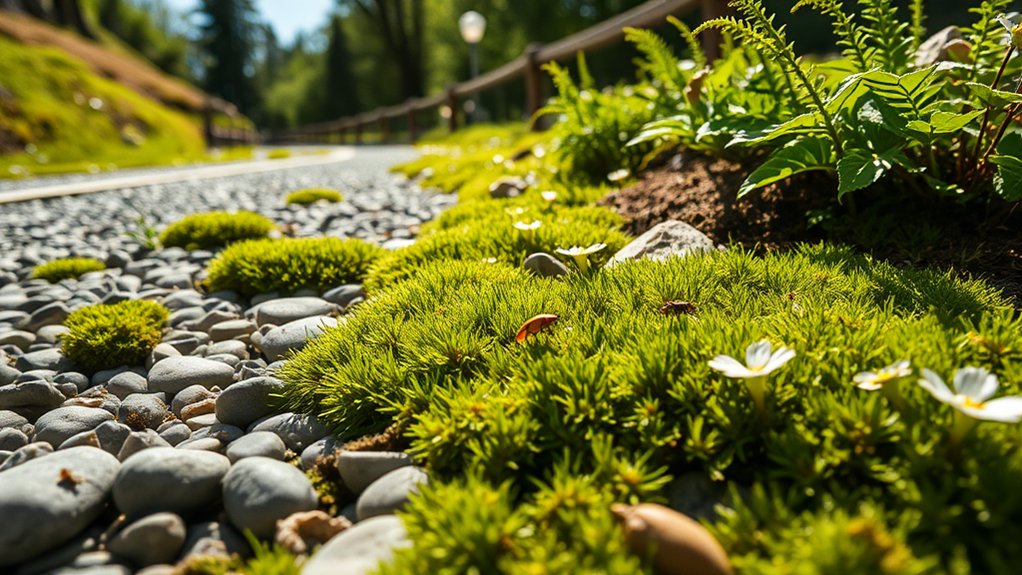
Permeable gravel driveways help protect British soil conditions that our native plants need to thrive. The surface lets rainwater drain naturally, which feeds local plant life and creates vital spaces for wildlife, from hedgehogs to garden birds. This simple choice helps maintain healthy gardens and green spaces across our neighbourhoods. Additionally, the natural drainage properties of resin-bound gravel prevent flooding and enhance groundwater replenishment, further supporting the ecosystem. In fact, permeable driveways can handle up to 95% of rainfall, reducing surface water runoff significantly.
Protecting Soil Structure
Protecting soil structure is vital for local wildlife and plant life in our British gardens and landscapes. Permeable resin-bound gravel offers a practical solution by letting rainwater soak through naturally, much like a garden lawn would. This process helps maintain healthy groundwater levels – particularly important during our wet winters – and stops water from pooling on the surface. The surfaces support Sustainable Urban Drainage Systems (SuDS), crucial for effective water management in urban environments.
Think of it as a protective layer that works with nature rather than against it. Unlike concrete or tarmac, which can lead to waterlogged gardens and soil erosion, resin-bound gravel keeps the ground stable and well-drained, making it a favored choice for various outdoor applications.
It’s especially useful for driveways and paths where regular foot traffic might otherwise compress the soil.
The installation process is straightforward and causes minimal disruption to existing garden plants and wildlife. For British homeowners looking to balance practical outdoor surfaces with environmental responsibility, resin-bound gravel provides a durable, eco-friendly option that helps preserve our local ecosystems.
Enhancing Biodiversity Support
Supporting Garden Wildlife With Permeable Gravel
Permeable resin-bound gravel in your garden does more than just look good – it actively helps local wildlife thrive. The material’s porous nature creates perfect conditions for native plants to grow, giving local insects and small animals the habitats they need.
British pollinators like bumblebees, butterflies and hoverflies particularly benefit from this setup. The gaps between the gravel allow insects to move freely and access soil, while native flowering plants can establish themselves naturally in and around the surface.
Think of it as creating your own mini nature reserve. The combination of permeable gravel and native plants supports local biodiversity far better than solid paving or artificial grass.
You’ll likely spot more birds visiting too, as they feed on the increased insect population.
For best results, choose native plant species that suit your area – lavender, cornflowers and wild marjoram are excellent options that flourish in these conditions whilst supporting British wildlife.
Natural Rainwater Filtration
Natural rainwater filtration through gravel systems keeps our local plants and wildlife thriving.
These setups boost rainwater collection and create sustainable gardens by letting water soak into the ground, which tops up our groundwater supplies.
Main advantages:
- Water Control: Cuts down on surface water, taking pressure off our drains and sewers.
- Better Soil: Keeps soil properly damp, helping plants grow and maintaining a healthy environment.
- Wildlife Protection: Creates stable habitats with reliable water sources and quality.
In British gardens, these systems work particularly well with our frequent rainfall, helping manage those typical autumn downpours and spring showers whilst supporting local hedgehogs, birds and garden plants.
Use of Natural and Sustainable Materials
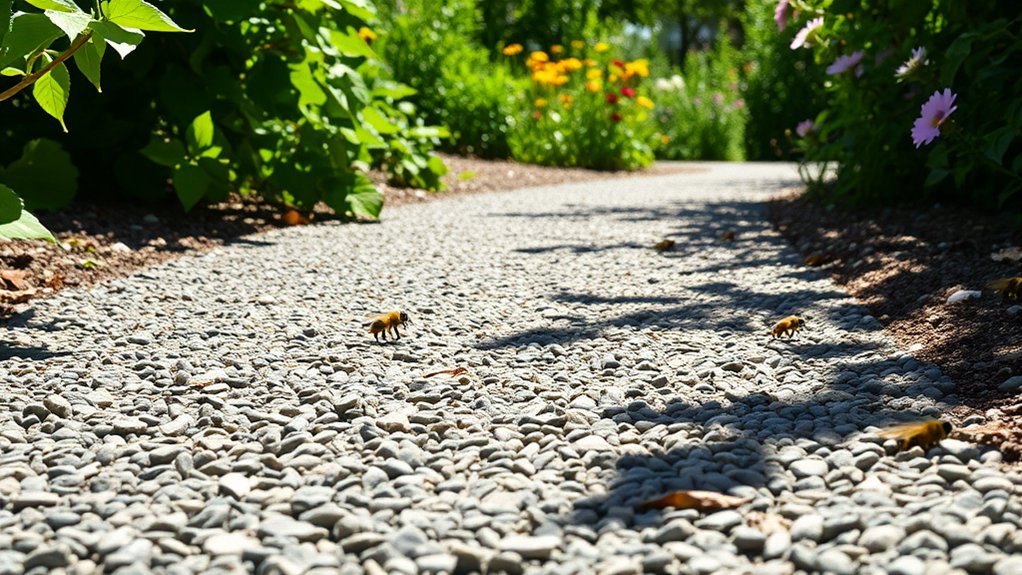
Natural and sustainable paving materials are vital for reducing environmental impact in UK projects. Local materials like gravel or Cornish quartz cut transport emissions and boost regional businesses.
Resin-bound gravel works particularly well in British gardens, protecting soil and roots whilst blending with the surroundings. This surfacing option combines natural stone with resin to create a practical, low-maintenance alternative to traditional concrete or tarmac.
It’s especially suited to our wet climate, as it’s permeable and helps prevent flooding. The initial cost might be higher than standard paving, but it lasts longer and needs less upkeep, saving money over time.
Using these materials helps preserve local wildlife habitats and maintains the natural character of British landscapes, from countryside gardens to urban driveways.
Compliance With Sustainable Urban Drainage Systems (SUDS)
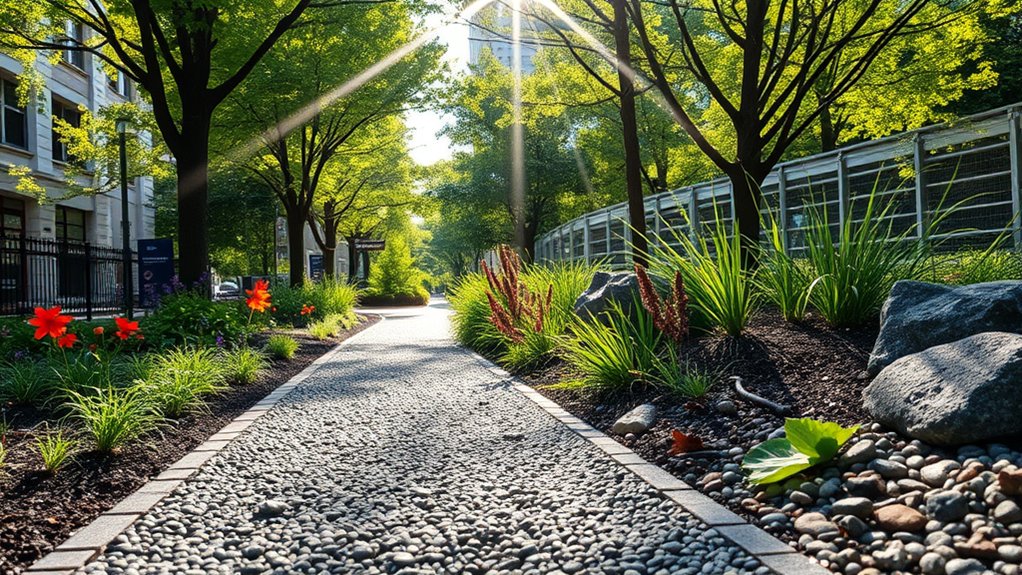
The use of permeable gravel must align with SUDS regulations in the UK. These rules help maintain natural water flow and protect towns and cities from flooding.
Following SUDS guidelines, such as proper gravel depth and correct sub-base preparation, ensures both legal compliance and effective rainwater management in urban areas.
For example, a well-installed permeable gravel driveway allows rainwater to soak through naturally, rather than overwhelming street drains during heavy rainfall.
This approach works particularly well in British conditions, where frequent rain makes sustainable drainage crucial.
SUDS Regulations Overview
SUDS Regulations: A UK Guide
Getting to grips with Sustainable Urban Drainage Systems (SUDS) regulations is crucial for any new development in the UK. Think of SUDS like a building’s water management system – it needs proper planning and approval, much like getting planning permission for an extension.
Essential regulatory requirements:
- Legislation: The Flood and Water Management Act 2010 requires approved drainage plans for managing surface water. This means showing exactly how you’ll handle rainfall and runoff, similar to submitting detailed building plans.
- Approval Process: Most new developments need SUDS approval from the local authority. A housing estate, for instance, must demonstrate effective drainage before breaking ground.
- Maintenance Plans: You must outline who’ll maintain the SUDS and how – whether it’s the property owner, management company or local council.
Just as a homeowner maintains their guttering, SUDS need regular upkeep to work properly.
Natural Water Cycle Maintenance
Maintaining the natural water cycle in Britain requires proper drainage management. Resin-bound gravel surfaces work effectively with Sustainable Urban Drainage Systems (SUDS), helping rainwater filter naturally into the ground. These surfaces cut down on puddles and flooding whilst supporting local groundwater levels.
Simple upkeep keeps the system working:
| Maintenance Task | Why It Matters |
|---|---|
| Vacuum cleaning | Stops leaves and dirt blocking water flow |
| Pressure washing | Clears blocked pores |
| Snow clearing | Protects the stone layers underneath |
Regular maintenance ensures these surfaces stay permeable and last longer, making them a practical choice for British weather conditions.
Urban Resilience Enhancement
Urban Resilience Enhancement
British cities face mounting pressures from climate change and growing populations, making permeable resin-bound gravel a vital addition to city planning. This surface material meets SUDS requirements whilst tackling water management challenges head-on.
Key advantages:
- Flood Prevention: Absorbs rainwater directly into the ground, reducing surface water on streets and pavements
- Cleaner Water: Naturally filters out pollutants before water reaches local streams and rivers
- Local Involvement: Gets residents invested in neighbourhood sustainability through visible green infrastructure
Common applications include car parks, driveways and pedestrian areas, where traditional concrete or tarmac would otherwise contribute to localised flooding during heavy rainfall.
The system proves particularly effective in areas like Manchester and London, where storm surges often overwhelm existing drainage.
Reduced Environmental Impact

Permeable gravel offers a greener choice compared to traditional hard surfaces, with clear environmental benefits for UK properties. The surface naturally filters rainwater, trapping pollutants before they reach local waterways and aquifers. This helps protect British wildlife and plant life, particularly during our increasingly wet seasons.
Using local stone and aggregates cuts down on transport miles, whilst the surface’s durability means less frequent replacement – saving both resources and money. It’s particularly effective in British gardens and driveways, where it helps prevent flooding and maintains healthy soil conditions for surrounding plants.
The system aligns with UK drainage regulations (SUDS), making it ideal for both urban and rural settings. For homeowners concerned about environmental impact, permeable gravel provides a practical solution that supports local ecosystems whilst meeting modern sustainability standards.
Enhanced Drainage and Flood Prevention
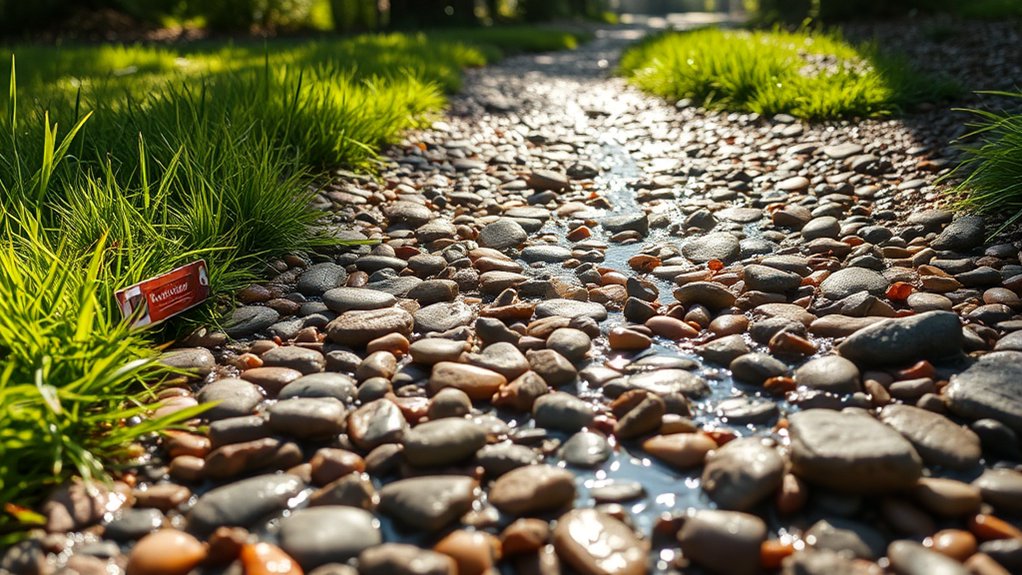
Permeable gravel helps prevent flooding and improves drainage whilst supporting local wildlife. The surface lets rainwater soak into the ground naturally, which reduces flood risks and takes pressure off regular drainage systems.
- Natural Filtration: Traps dirt and pollution as rain filters through
- No Standing Water: Stops puddles forming, cutting down on erosion
- Planning Friendly: Meets UK sustainable drainage (SuDS) requirements
These surfaces can handle most rainfall and help top up groundwater levels.
For British homes and businesses dealing with increasing rainfall, resin-bound gravel offers a practical solution that’s both effective and environmentally sound.
Support for Biodiversity
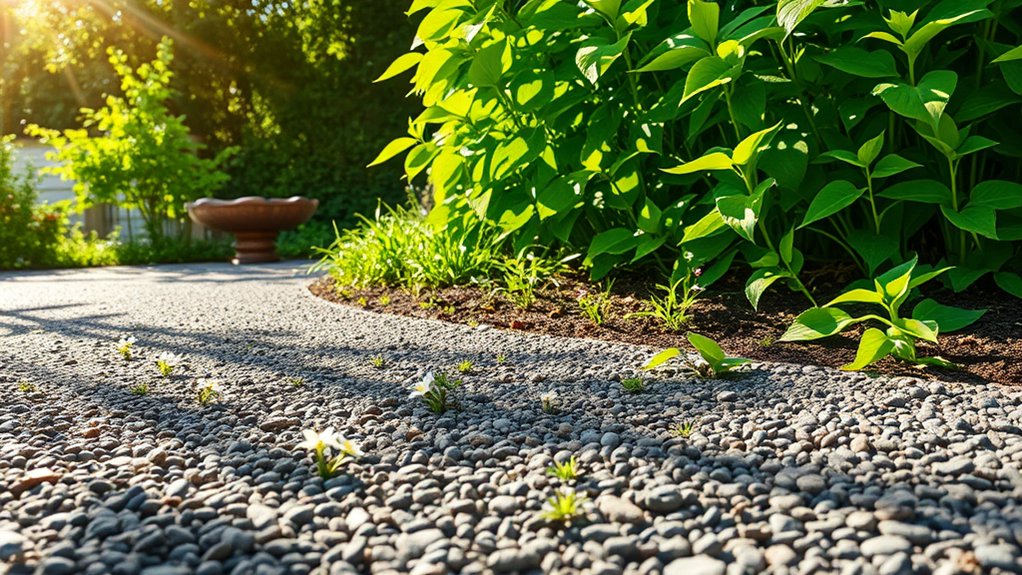
Permeable gravel supports wildlife and plant life across British urban spaces.
The gravel allows rainwater to soak naturally into the ground, much like traditional meadowland, creating healthier soil conditions. Local plants thrive in these spaces, whilst small animals like hedgehogs and garden birds gain valuable connecting routes between green areas.
Common UK garden species, from native wildflowers to ground beetles, benefit from this more natural surface compared to concrete or tarmac.
Promotes Soil Health
Resin-bound gravel supports soil health by allowing rainwater to filter naturally through to the ground below. This process helps maintain groundwater levels and creates ideal conditions for plants and soil microorganisms.
Key benefits for soil health:
- The system maintains proper soil moisture levels, which plants need to thrive.
- Acts as a natural filter, trapping pollutants before they enter the soil.
- Reduces water runoff, preventing soil erosion and protecting garden stability.
The permeable surface encourages healthy soil development, supporting local wildlife and plant life. This makes resin-bound gravel an environmentally sound choice for UK gardens and landscaping projects, particularly in areas prone to waterlogging or erosion.
Think of it as a protective layer that works with nature rather than against it – much like a good garden mulch, but with the added benefit of being a sturdy, accessible surface.
Enhances Habitat Connectivity
Resin-bound gravel plays a vital role in connecting wildlife habitats across British towns and cities. This permeable surface creates natural pathways for common urban wildlife like hedgehogs and garden birds, helping them move safely between green spaces.
The surface allows rainwater to drain naturally into the ground, supporting local plants and creating healthier environments for wildlife. Unlike traditional paving, resin-bound surfaces help link isolated patches of habitat, from garden to garden and across urban areas.
This connectivity is particularly important in built-up areas where wildlife often struggles to find safe routes between feeding and nesting sites. The material’s eco-friendly properties make it an excellent choice for sustainable urban development, benefiting both local wildlife and the environment.
Long Lifespan and Durability

Choosing Long-Lasting Paving
Resin-bound gravel delivers exceptional durability and value for money compared to standard paving options. When properly installed using quality materials, it creates a robust surface that stands the test of time.
Key benefits:
- Quality resin-bound surfaces last up to 30 years
- Simple maintenance keeps the surface in top condition
- Quick, localised repairs possible without replacing entire areas
- Outlasts traditional loose gravel by 15-20 years
For perspective, whilst loose gravel needs replacing every 5-10 years, a well-maintained resin-bound driveway installed by qualified professionals could serve a family home for three decades.
The initial investment typically pays for itself through reduced replacement and maintenance costs over time.
Aesthetic Integration With Natural Landscapes
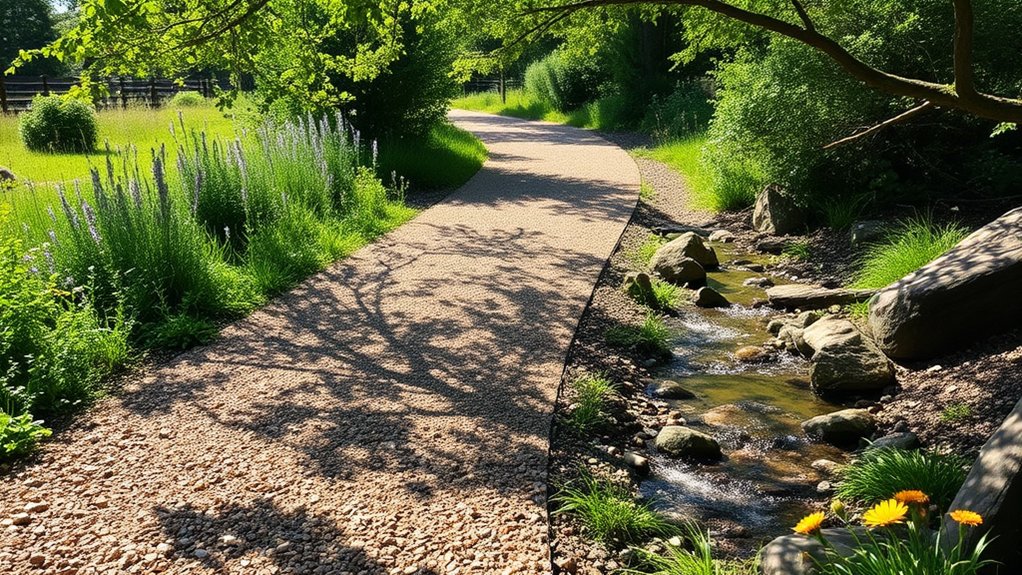
When blending pathways into natural settings, resin-bound gravel offers exceptional aesthetic value.
Its range of colours and textures perfectly mirror the natural environment, from woodland browns to garden stone greys. Choose tailored mixes to complement your existing garden features – for instance, matching local stone or surrounding soil tones.
The material’s versatility means you can create flowing, natural-looking paths without jarring straight lines. The surface remains smooth yet porous, looking authentic whilst allowing rainwater to drain properly and keeping your garden healthy.
This practical approach delivers both visual appeal and sensible landscaping, making it ideal for British gardens and outdoor spaces.
Economic Benefits for Local Communities
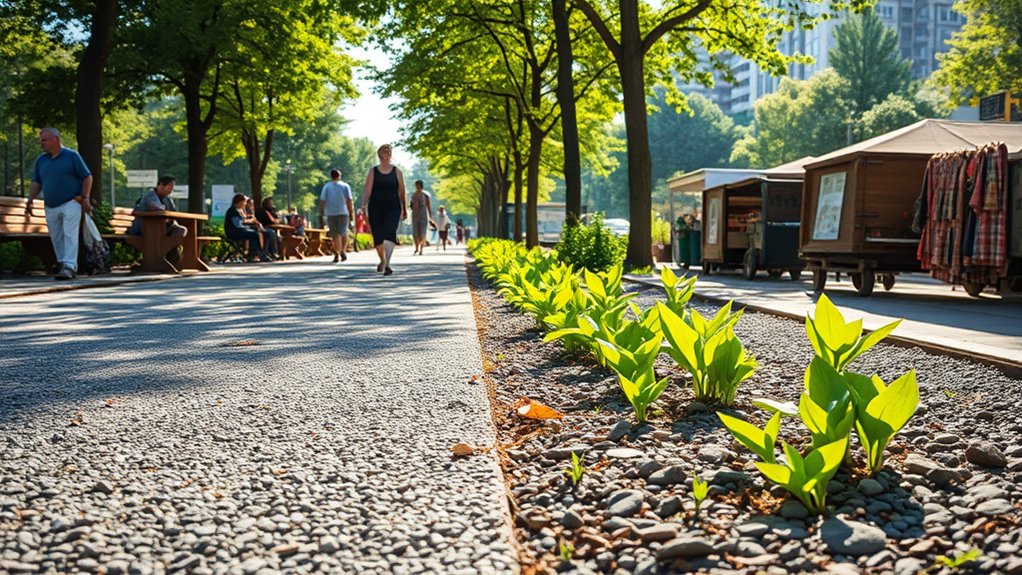
Economic Benefits for Local Communities
Permeable gravel surfaces offer tangible financial advantages for UK communities whilst improving outdoor spaces.
The practical benefits extend beyond aesthetics to deliver real economic value:
- Reduced Maintenance Costs: Council budgets benefit from lower upkeep expenses, with fewer repairs needed compared to traditional paving.
- Job Creation: Using locally-sourced gravel supports regional quarries and contractors, boosting employment in the area.
- Stormwater Management Savings: Natural drainage cuts costs on flood prevention infrastructure, particularly valuable in Britain’s rainy climate.
Mitigation of Urban Heat Island Effect
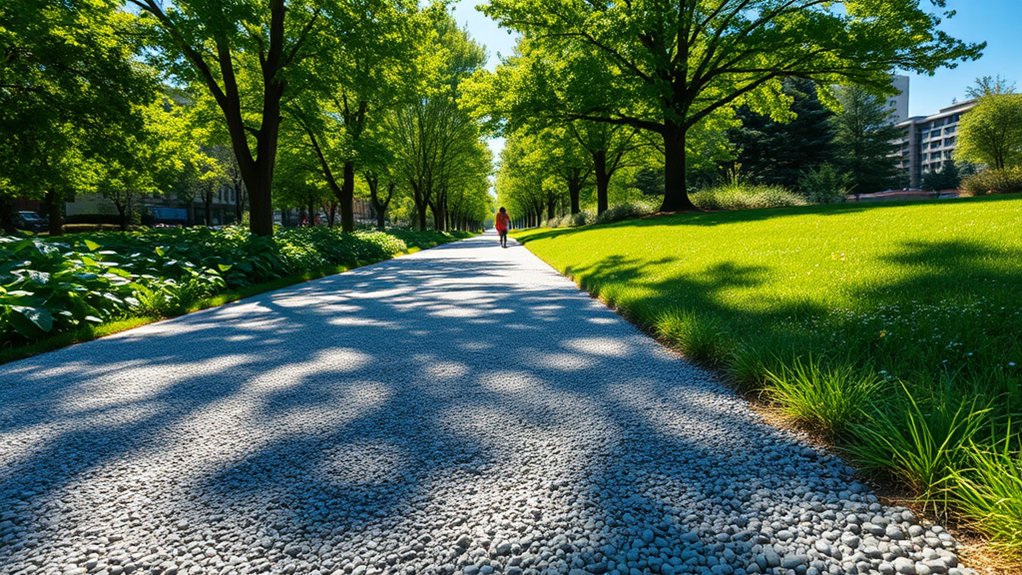
Permeable gravel surfaces help cool our cities whilst adding value to local areas. Unlike tarmac, these surfaces absorb less heat and allow water to seep through, much like a natural cooling system.
Think of it as your garden on a hot day – when water evaporates from soil, it helps cool the surrounding area. The same happens with permeable gravel in urban spaces.
This cooling effect makes our cities more liveable and can slash energy bills, as buildings don’t need as much air conditioning. For instance, a typical high street with permeable surfaces might feel several degrees cooler than one covered entirely in traditional paving.
These surfaces are vital for tackling the urban heat island effect – where cities are notably warmer than surrounding rural areas – making them a practical solution for our increasingly warm British summers.
Contribution to Climate Resilience
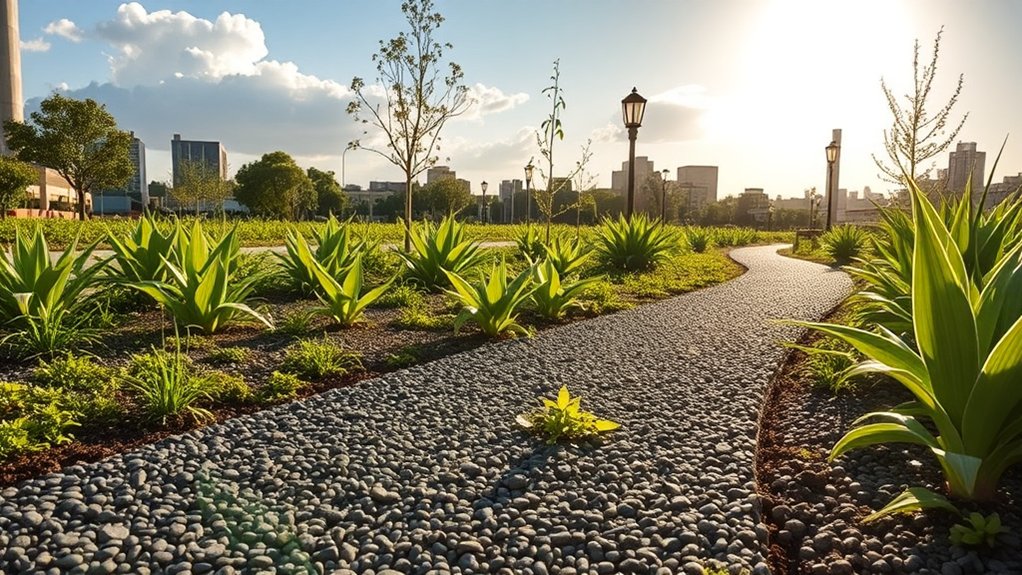
Climate-Resilient Surfacing
As our weather becomes more extreme, resin-bound gravel stands out as a practical choice for UK towns and cities. It works particularly well in areas prone to flooding and helps future-proof urban developments.
- Natural Drainage: Works like a sponge during heavy rainfall, preventing puddles and surface flooding common on British streets.
- Water Table Benefits: Allows rainwater to seep through naturally, helping maintain local groundwater levels – crucial during our increasingly dry summers.
- Cleaner Water: Acts as a natural filter, catching road pollutants before they reach local streams and rivers.
These features prove especially valuable in British residential areas and car parks, where traditional concrete and tarmac often struggle with drainage during our wet winters.
Frequently Asked Questions
How Does Permeable Resin-Bound Gravel Compare to Traditional Paving Materials?
Resin-bound gravel outperforms traditional paving in several key areas, particularly for British weather conditions. The surface allows rainwater to drain naturally into the ground, unlike concrete or standard block paving which often leads to puddles and garden flooding. It’s particularly effective for UK driveways and garden paths, where constant rainfall can be problematic. Moreover, this eco-friendly option helps reduce local flood risks and complies with sustainable urban drainage regulations that many councils now require.
Can Permeable Surfaces Be Installed on Slopes?
Permeable surfaces work well on slopes, but require proper installation. The drainage properties actually help stabilise the ground, though getting the angle and drainage right is crucial. For best results on steeper inclines, consider options like reinforced grass or permeable block paving – similar to what you’d see in car parks or garden paths. Poor installation can lead to water pooling or surface failure, so professional fitting is strongly recommended.
What Maintenance Is Required for Resin-Bound Gravel Surfaces?
Regular maintenance of resin-bound gravel surfaces involves straightforward cleaning with a stiff brush and occasional pressure washing. Avoid using harsh chemical cleaners, as they might damage the resin’s bonding. Keep drainage channels clear of debris, particularly during autumn when leaves collect. A quick sweep every fortnight prevents moss build-up and maintains the surface’s grippy texture, especially important for British weather conditions. For stubborn marks, a gentle wash with warm, soapy water typically does the trick.
How Does Resin-Bound Gravel Impact Local Wildlife Habitats?
Resin-bound gravel offers several benefits to local wildlife in British urban areas. The surface allows hedgehogs, frogs and other small creatures to move safely between gardens and green spaces. Its permeable structure helps maintain natural water drainage, supporting plant life and preventing waterlogging that can harm wildlife habitats. Unlike traditional concrete or tarmac, these paths create wildlife-friendly corridors whilst providing practical outdoor surfaces for homes and businesses.
Is Permeable Resin-Bound Gravel Suitable for Heavy Traffic Areas?
Permeable resin-bound gravel performs well under heavy traffic when properly installed. The system’s durability makes it suitable for busy areas such as car parks, driveways and commercial spaces. Much like traditional tarmac, it can handle regular vehicle movement whilst offering better drainage properties. The key lies in correct base preparation and professional installation to ensure long-term performance.
Conclusion
Installing permeable resin-bound gravel delivers genuine environmental advantages for UK properties. The system effectively manages surface water runoff, helping prevent localised flooding whilst supporting nearby plant and wildlife habitats. It meets Sustainable Urban Drainage Systems (SUDS) requirements and proves particularly valuable in urban areas where concrete and tarmac dominate. Beyond flood prevention, these surfaces reduce the heat island effect common in British cities and towns, whilst offering an attractive, low-maintenance alternative to traditional paving. The material’s natural drainage properties make it especially practical for our rainy climate, protecting both your property and the wider environment.
